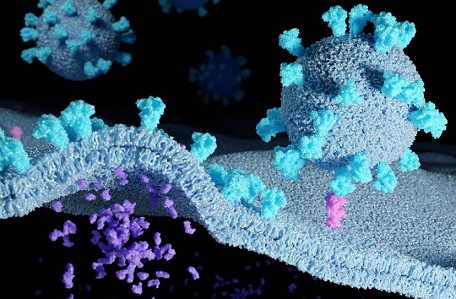Exploring The Potential Of α7 Nicotinic Acetylcholine Receptor Modulators In Preventing SARS-CoV-2 Entry Into Astrocytoma Cells
Nikhil Prasad Fact checked by:Thailand Medical News Team Mar 26, 2024 1 year, 10 months, 2 weeks, 3 days, 7 hours, 11 minutes ago
COVID-19 News: The ongoing SARS-Cov-2 pandemic has had a profound impact on global health, with millions of lives lost and significant disruptions to daily life. While vaccination efforts and public health measures have helped curb the spread of the virus, the emergence of new variants highlights the need for continued research into effective treatments. One promising avenue involves disrupting the interaction between the virus and host cells, particularly through the angiotensin-converting enzyme 2 (ACE2) receptor, which serves as the entry point for SARS-CoV-2.
 Potential Of α7 Nicotinic Acetylcholine Receptor Modulators In
Potential Of α7 Nicotinic Acetylcholine Receptor Modulators In
Preventing SARS-CoV-2 Entry Into Astrocytoma Cells
In this
COVID-19 News report, we delve into recent research conducted at the Palladin Institute of Biochemistry in Kyiv, Ukraine focusing on the role of α7 nicotinic acetylcholine receptor (α7 nAChR) modulators in preventing SARS-Cov-2 from binding to astrocytoma cells. By understanding the mechanisms behind this interaction, the study team aimed to shed light on potential therapeutic interventions that could help mitigate the impact of COVID-19.
Background and Rationale
The ACE2 receptor plays a crucial role in the cellular entry of SARS-Cov-2, making it a prime target for therapeutic intervention. Strategies to block ACE2 without disrupting its enzymatic function have been explored, but the emergence of new variants raises concerns about the long-term efficacy of such approaches. Another approach involves targeting the receptor binding domain (RBD) of the SARS-Cov-2 spike protein, although mutations in this region can reduce the effectiveness of targeted therapies.
A unique aspect of SARS-Cov-2 is its interaction with α7 nAChRs, facilitated by a specific RRAR motif present in the virus's spike protein. Previous studies have shown that this interaction may play a role in viral entry into cells, particularly in neuronal tissues. Additionally, α7 nAChRs have been identified as contiguous with ACE2, suggesting a potential link between these receptors in the context of SARS-Cov-2 infection.
Research Methodology
The research conducted at the Palladin Institute of Biochemistry involved experiments using human astrocytoma U373 cells, which express the ACE2 receptor. The study utilized various reagents, including ACE2-specific antibodies, recombinant RBD proteins, and α7 nAChR agonists and modulators. Cell-based assays, such as Cell-ELISA and Sandwich ELISA, were employed to assess the binding of RBD to ACE2-expressing cells and the interaction between ACE2 and α7 nAChR.
Results and Discussion
The findings of the study revealed several key insights into the potential role of α7 nAChR modulators in preventing SARS-Cov-2 binding to astrocytoma cells. Firstly, U373 cells were shown to express ACE2 receptors, confirming their susceptibility to SARS-Cov-2 infection. The study also demonstra
ted that α7 nAChRs and ACE2 form a complex in these cells, highlighting a potential mechanism for viral entry.
Interestingly, the researchers observed that certain α7 nAChR agonists, such as choline and PNU282987, were effective in inhibiting the binding of RBD to ACE2-expressing cells. In contrast, a competitive antagonist, methyllicaconitine (MLA), did not show the same inhibitory effect. Moreover, positive allosteric modulators (PAM2) like PNU120596 and hydroxyurea (HU) also demonstrated inhibitory effects on RBD binding.
These findings suggest that activating or modulating α7 nAChRs could be a viable strategy for preventing SARS-Cov-2 from entering target cells. By disrupting the interaction between RBD and ACE2, these compounds may impede viral penetration and reduce the risk of infection.
Implications and Future Directions
The research conducted at the Palladin Institute of Biochemistry provides valuable insights into the potential therapeutic targets for combating COVID-19. By targeting α7 nAChRs, researchers may develop novel treatments that complement existing strategies, such as vaccines and antiviral medications.
Future studies could explore the specific mechanisms underlying the interaction between α7 nAChRs and SARS-Cov-2, including the role of the RRAR motif and potential binding sites on the receptor.
Additionally, clinical trials may be warranted to evaluate the efficacy and safety of α7 nAChR modulators in human patients with COVID-19.
In conclusion, the study underscores the importance of interdisciplinary research in combating infectious diseases like COVID-19. By leveraging our understanding of molecular interactions and receptor signaling pathways, we can develop targeted interventions that hold promise for controlling the spread of SARS-Cov-2 and mitigating its impact on public health.
The study findings were published in the peer reviewed journal: Biochemical and Biophysical Research Communications.
https://www.sciencedirect.com/science/article/abs/pii/S0006291X24003619
For the latest
COVID-19 News, keep on logging to Thailand Medical News.
